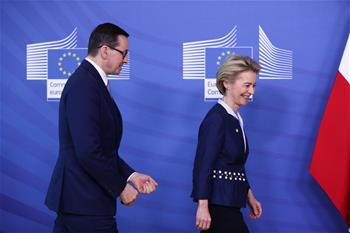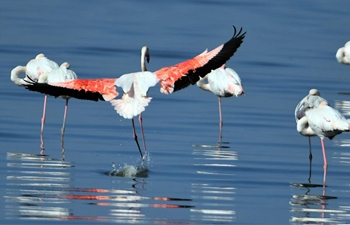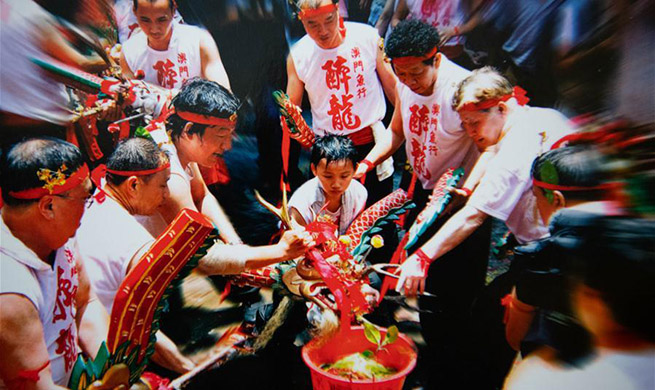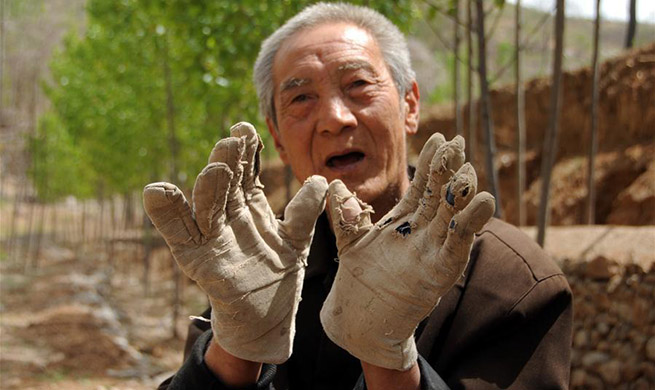by Ndalimpinga Iita
WINDHOEK, Dec. 12 (Xinhua) -- Mountains in Namibia's capital Windhoek have not only accorded city youth wellness, but also drive innovation and business prosperity.
Some years back, Nico Sombeyo, a youth from Windhoek, was unfit and diagnosed with high cholesterol. He was thwarted. A medical doctor had advised him to change his lifestyle.
"Apart from changing my diet, I pondered what I could get fit to live a complementing healthy lifestyle until I discovered mountain hiking," he said.
Today, Sombeyo is now one of the many young people in the City enduring the steep and sloppy mountains of Windhoek to get fit.
At the mountains with trails including that in Auas-Blick, Klein Windhoek residential areas and other mountains on the outskirts of the city, young people participate in speed hiking, walking and running -- as individuals, with, families, groups, and wellness clubs.
"Since I started mountain hiking, complemented by my diet, it has not only aided to my weight loss but also improved my physique and overall wellness. Because when I climb, through the endurance I burn fat and release stress," he said Thursday morning.
The youth also see activities around mountains as a safe mode of socialization.
"There, one meets like-minded people. We encourage each other and organize mountain walks in groups," he added.
He is not the only one. Most people in the city also turned to mountain hiking and other activities for mental health and wellness.
Recent records by the Namibian Police show that about 373 people committed suicide between January and November this year.
While a Ministry of Health and Social Services study revealed that Namibia has one of the highest suicide rates in the world, it was ranked fourth in Africa and eleventh worldwide.
Eve Silas turned to mountain climbing to overcome depression.
"Outdoor activities aided in my calmness. As I became a frequent hiker, I started seeing things differently. I can say it saved my life as I was suicidal, hence I now have a lifetime contract with mountain hiking," Silas said.
Mountains not only serve as a place for socialization and overcoming life difficulties, but has also inspired entrepreneurial fever amongst young fitness coaches and trainers to execute their fitness plans and grow business.
When Fidel Hango started as a fitness coach, he was seeking ways to train his clients. Then, he would hire sports grounds and space in other recreational facilities, which came at a cost.
But with time, he learnt of mountains on the outskirts of Windhoek and Auas-Blick residential area where people hike and climb for free.
Since incorporating activities oriented around mountains, according to Hango, clients are also pleased with the impact and results. The business has since grown as more clients embrace physical activities in groups and nature.
"Unlike other venues, the mountain is free to use. No fees are charged. This helps me channel the funds I would have used for hiring a venue to grow other business areas and development programmes. Clients also love natural effects the mountain hiking offers," he added.
Mountains are home to 15 percent of the world's population and a quarter of the world's land animals and plants, according to the United Nations.
Meanwhile, the youth said it is not only about the mountains taking care of their health, but also sustainably utilizing the mountains.
"We use the trails to avoid damaging the plantation. We also avoid littering and disturbing the wildlife here so that we preserve the place that offers us refuge when we are seeking for physical health and mental wellness. We embrace biodiversity," said Silas, who also went hiking just before the sunset on International Mountain Day on December 11.
Such conduct and efforts would contribute to fulfilling the Sustainable Development Goals to manage natural resources sustainably, combat desertification, reverse land degradation, and halt biodiversity loss.
The International Mountain Day, held under the theme mountains matter for youth is observed annually on December 11.













